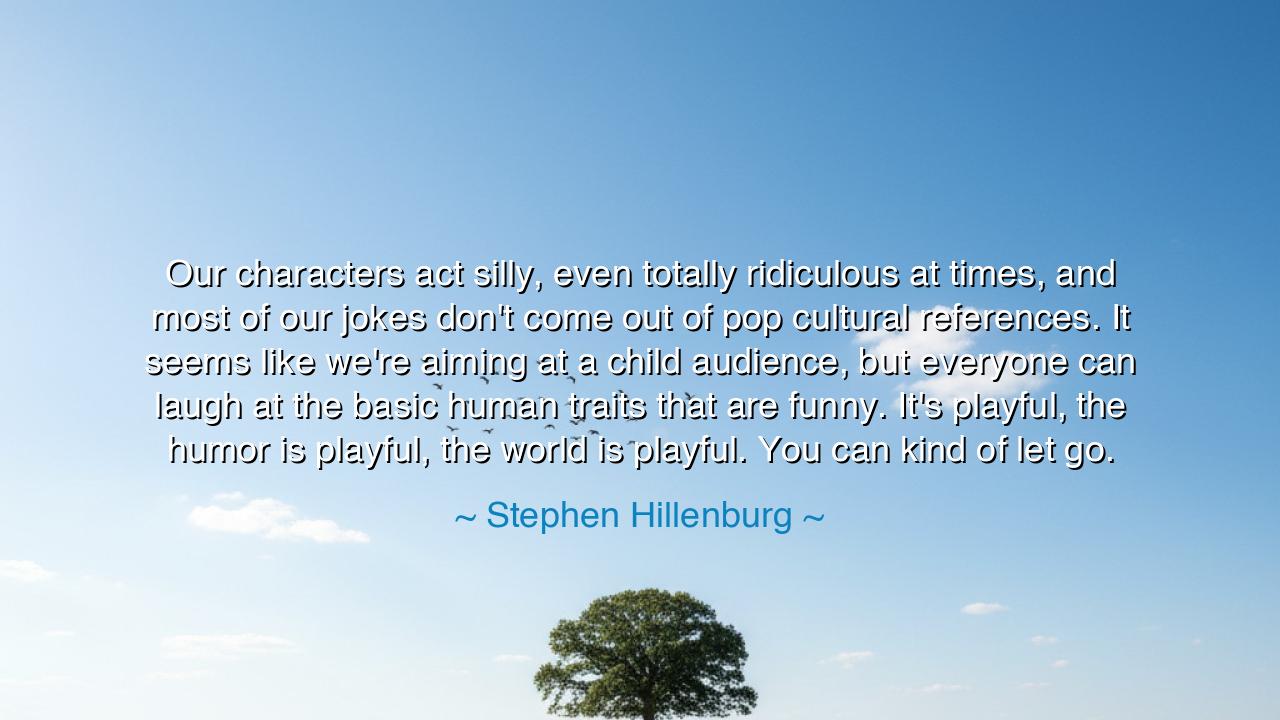
Our characters act silly, even totally ridiculous at times, and
Our characters act silly, even totally ridiculous at times, and most of our jokes don't come out of pop cultural references. It seems like we're aiming at a child audience, but everyone can laugh at the basic human traits that are funny. It's playful, the humor is playful, the world is playful. You can kind of let go.






The words of Stephen Hillenburg, creator of the joyful world beneath the sea, carry a wisdom far deeper than the waves that inspired them. “Our characters act silly, even totally ridiculous at times… It seems like we’re aiming at a child audience, but everyone can laugh at the basic human traits that are funny. It’s playful, the humor is playful, the world is playful. You can kind of let go.” In these words lies a truth the ancients themselves would have known — that laughter, in its purest form, is not the possession of the young or the old, but the breath of the soul itself. To laugh, to be playful, to let go, is to return to the innocence from which all wisdom is born.
In the ancient world, the philosophers spoke of balance — of body, mind, and spirit. The Greeks called it eutrapelia, the noble art of playfulness, which kept the heart light and the mind clear. They believed that even the wisest sage must, at times, laugh at himself, for solemnity untempered by joy becomes arrogance, and learning without laughter becomes a burden. Thus, Hillenburg’s vision — of characters who are “silly, even ridiculous” — is not childishness, but a restoration of this forgotten harmony. His world invites us to look not down, but inward — to rediscover the divine child who still knows how to find wonder in the absurd.
There was once a time when Diogenes, the philosopher who lived in a barrel, walked through Athens in broad daylight carrying a lamp. When asked what he sought, he said, “I am looking for an honest man.” The people laughed, for his actions seemed foolish. Yet within his ridiculousness lay profound truth — a mirror held up to the hypocrisy of the world. So too does Hillenburg’s art teach us that within the silly, there lies wisdom; within the ridiculous, revelation. To embrace play is to acknowledge that truth often wears a clown’s mask, and that joy is not the opposite of depth, but its companion.
Hillenburg’s humor does not rely on the fleeting flames of pop culture or the sharpness of satire. It springs from something older, purer — the basic human traits that are funny, the eternal quirks of our shared humanity. The greed of Mr. Krabs, the optimism of SpongeBob, the grumpiness of Squidward — these are not mere cartoons, but archetypes, timeless reflections of ourselves. Their laughter crosses the barriers of age and time because it does not mock, but embraces. It is laughter without cruelty, joy without condition — the kind of laughter that, like the ocean, connects every shore.
The ancient Zen masters understood this truth as well. There is a tale of a monk who, after years of meditation, suddenly burst into uncontrollable laughter under a tree. When asked what wisdom he had found, he replied, “I have realized that all this striving was for nothing. The sky was always blue.” Hillenburg’s words carry that same freedom — the wisdom of those who have seen through the seriousness of life and found the infinite playfulness of existence. For to “let go,” as he says, is not to be careless, but to be free — free from the chains of expectation, judgment, and fear.
The world of play, as Hillenburg envisioned it, is not an escape from reality but a return to it. When we laugh sincerely, we remember who we are — not workers, not titles, not roles, but living beings made of curiosity and wonder. In this way, his art stands as a quiet rebellion against the heaviness of modern life, reminding us that joy is sacred. Like children who laugh at the simplest things, we too are invited to rediscover the rhythm of delight that once guided our days.
So let this be the teaching: do not grow too proud to laugh, nor too serious to play. Let your heart dance in the absurdity of life, and your spirit breathe in its playful humor. For in laughter, you cleanse the soul; in play, you awaken the divine. Laugh not only at others, but at yourself — for that is the laughter of the wise. Drink deeply from the waters of simplicity, as Hillenburg did, and you will find that beneath the silliest of waves lies the deepest ocean of peace.
And when the burdens of the world grow heavy, remember his words: “You can kind of let go.” Let them wash over you like saltwater over stone. Smile at your imperfections, forgive the world its madness, and laugh — for laughter, my friend, is the oldest prayer known to humankind.






AAdministratorAdministrator
Welcome, honored guests. Please leave a comment, we will respond soon